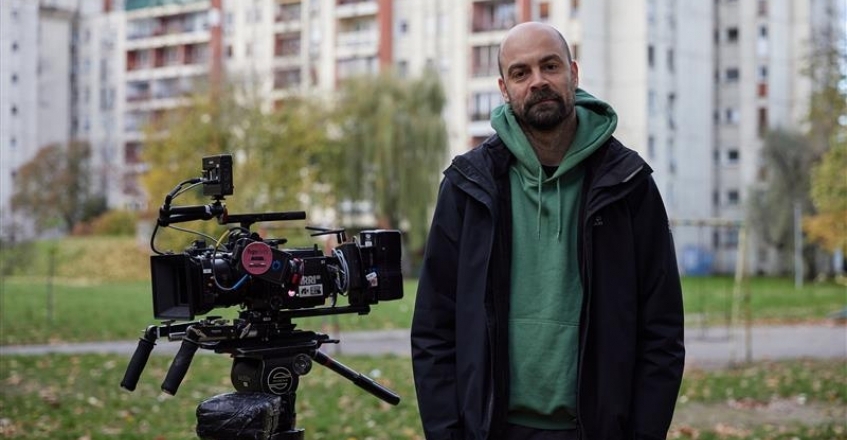News
Vladimir Tagić: The Car Which is a Metaphor for our Lives, Full of Absurdities, Illogical Moments, Beauty, And Strange Flaws We Cannot Resolve
In the film „Yugo Florida“, director Vladimir Tagić tells the story of a son who decides to care for his estranged and unbearable father during the final weeks of his life. The film will be screened tonight at National Theatre Sarajevo.
What does it feel like to have the world premiere of your debut film „Yugo Florida“ at the Sarajevo Film Festival, where you were a participant in Sarajevo Talents 15 years ago?
Everything feels perfectly connected. Not only was Sarajevo the first festival to give me a chance, back when I was still a student, but I’ve also had great screenings of my series there and always felt like I naturally belonged at this festival. When I received the invitation to be part of the competition program and have the world premiere of my film in Sarajevo, my first thought was: Of course, this is exactly where it should be.
Considering your experience as the creator of the popular TV series “Operation Sabre” and “Morning Changes Everything”, what was the biggest challenge in working on your first feature film?
The fact that this film is my greatest passion, and that I’ve been dreaming about making my first feature since high school. I have enormous respect and love for films, which makes the responsibility and desire to create something meaningful even greater.
Are there aspects of working on a film that were easier or more challenging compared to the television format you’re used to?
Financing a film takes a very long time. Patience is crucial. With TV series, it’s a bit different, it’s often possible to secure funding more quickly. With a film, there’s always the question: Why? Why am I making this film when there are so many reasons to give up? There are countless reasons not to make a film, but you only need one reason to make it.
As for the creative approach, the differences between working on series and films have almost disappeared. TV series have advanced so much that they now resemble films both in content and in the way stories are told. What does concern me slightly about series is the tendency to fall into a formula. There’s a greater inclination to produce content following a “recipe.” Most people forget that the essence lies in breaking the formula and finding a way to offer something truly unique.
“Yugo Florida” is not just a title, but also the central motif of the film. Is there a personal story or inspiration behind choosing that car and this story in general?
I had various associations: an exotic name hiding a car of questionable quality. A combination of seemingly incompatible elements. A name that is absurd in itself. What do Yugoslavia and Florida have in common? A car with a mysterious malfunction that no one can fix... All of this feels like a metaphor for our lives, full of absurdities, illogical moments, beauty, and strange flaws we cannot resolve.
You co-wrote the screenplay about the relationship between a son and his terminally ill father with Milan Ramšak Marković. How did your collaboration unfold, and what was the most challenging part of the joint writing process?
This film contains autobiographical elements, and at first I tried writing it on my own, but I couldn’t manage it. Everything felt too personal, and I couldn’t separate what was important to me from what was actually good for the story. That’s when I invited Milan, we had already worked together on Jutro, and I felt he was someone who could understand and sense what I wanted.
Milan was, on one hand, gentle, but on the other, strict in deciding what belonged in the film and what didn’t. The biggest challenge was establishing the structure, understanding what kind of road movie we were making and realizing that our characters don’t have a clear path or goal. Their journeys are short, fleeting, fragmented, and we don’t know where they lead.
Why did you choose for Zoran to work in the production of a reality show?
I tried to use the job Zoran does as a metaphor for the problem he struggles with: loneliness. I think that being a reality show worker, whose main task is to observe other people while they sleep, while he himself suffers from insomnia, is an apt metaphor for loneliness. The game that develops between him and one of the participants, Ema, became a perfect field to depict the need for closeness.
I wasn’t interested in reality TV as a phenomenon of social critique or satire, it’s so obvious that it didn’t feel exciting enough as a motive. For me, the phenomenon of a reality show where you are constantly monitored, where cameras are always on you, was most interesting precisely as isolation, as the ideal environment in which you begin to lose your mind.
One of the main themes of the film is loneliness. Do you think it’s a pressing issue today?
I don’t know, there are so many problems today. (laughs) I can only say that, going through the loss of a loved one, what I felt more than anything else was loneliness and the need for closeness. That’s the feeling I wanted to convey in the film. It’s not just the main character who is lonely; all the characters are lonely, and they all have a longing to connect with one another.






